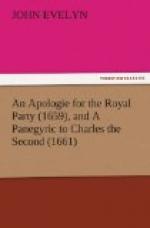13. Sir John Falstaff (pseud.), The Theatre (1720).
14. Edward Moore’s The Gamester (1753).
15. John Oldmixon’s Reflections on Dr. Swift’s Letter to Harley (1712); and Arthur Mainwaring’s The British Academy (1712).
16. Nevil Payne’s Fatal Jealousy (1673).
17. Nicholas Rowe’s Some Account of the Life of Mr. William Shakespear (1709).
18. Aaron Hill’s Preface to The Creation; and Thomas Brereton’s Preface to Esther.
Fourth Year (1949-1950)
19. Susanna Centlivre’s The Busie Body (1709).
20. Lewis Theobald’s Preface to The Works of Shakespeare (1734).
21. Critical Remarks on Sir Charles Gradison, Clarissa, and Pamela (1754).
22. Samuel Johnson’s The Vanity of Human Wishes (1749) and Two Rambler papers (1750).
23. John Dryden’s His Majesties Declaration Defended (1681).
24. Pierre Nicole’s An Essay on True and Apparent Beauty in Which from Settled Principles is Rendered the Grounds for Choosing and Rejecting Epigrams, translated by J. V. Cunningham.
{Transcriber’s notes:
1. Word unclear in original.
2. Original reads “perfidiousuess”; changed to “perfidiousness”.
3. Original reads “single person condemn”; changed to “single person; condemn”.
4. Original reads “extram”; changed to “extream”.
5. Word unclear in original.
6. Word unclear in original.
7. Original reads “Hypocrsie”; changed to “Hypocrisie”.
8. Original reads “butt hat”; changed to “but that”.
9. Original reads “ito their houses”; changed to “into their houses”.
10. Original reads “innocenie”; changed to “innocencie”.
11. Original reads “I have seens”; changed to “I have seen”.
12. Original reads “univresall”; changed to “universall”. }



